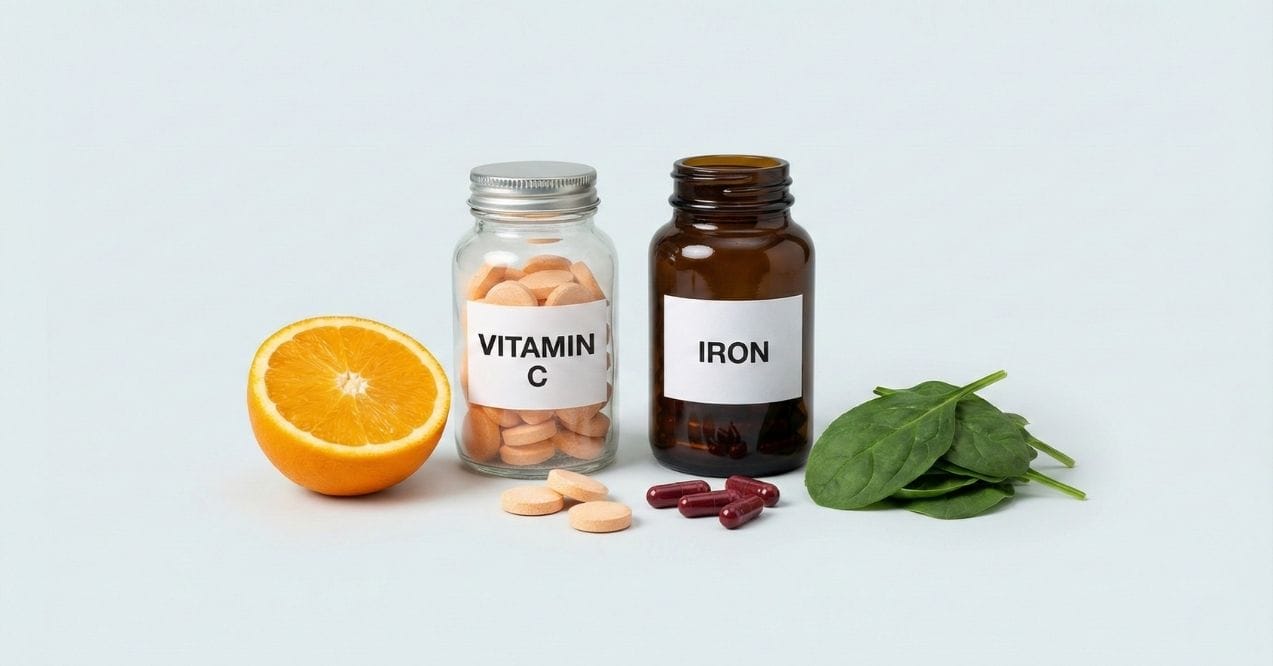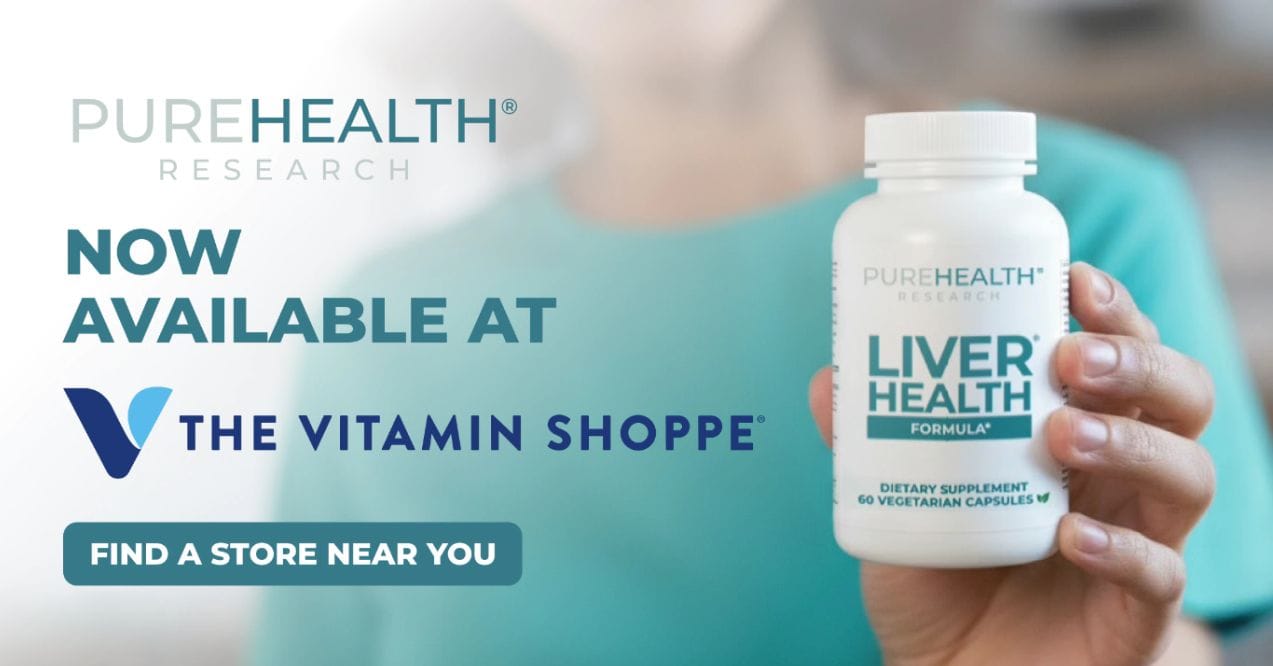Is Vitamin K Potassium? Find Out What’s The Difference
Is Vitamin K potassium? Understand their unique health benefits and the key differences in your diet.


Is Vitamin K potassium? Vitamin K and potassium are two vital nutrients essential for maintaining our body’s health, but there is often confusion between the two, especially due to their similar sounding names and abbreviations. It’s important to recognize the significance of understanding nutrients, their sources, and functions in our bodies.
Vitamin K, primarily known for its vital role in supporting blood and bone health, is frequently mistaken for potassium. However, potassium is a crucial mineral, instrumental in maintaining cellular function, heart health, and regulating body fluids.
The mix-up often stems from their similar sounding names and abbreviations. Vitamin K derives its name from the German word “Koagulationsvitamin,” leading to its abbreviation as “K,” while potassium is represented by the chemical symbol “K.”
In this blog, we will explore the distinct characteristics and health benefits of Vitamin K and potassium, emphasizing how their unique contributions to our health are essential for our understanding of nutrition and wellbeing.
What is Potassium?
Potassium is a vital mineral and electrolyte that plays a crucial role in maintaining various bodily functions. It is key to many aspects of health, and understanding its impact is essential. Here, we provide you an overview of what potassium is and why it’s important.
Potassium’s role in the Human Body:
- Nerve Function – Potassium is integral for the proper function of nerve cells. It helps in transmitting nerve signals, which are essential for communication between nerves and muscles, including the heart muscle.
- Muscle Cell Functioning – It plays a critical role in muscle contraction, including the smooth muscle in organs and the skeletal muscle used for movement.
- Fluid Balance – As an electrolyte, potassium helps regulate the balance of fluids in the body, which is essential for maintaining blood pressure and hydration levels.
Potassium’s importance for health:
- Cardiovascular Health – Adequate potassium intake is linked with lower blood pressure and a reduced risk of cardiovascular diseases.
- Bone Health – It aids in maintaining healthy bones by reducing calcium loss from the body.
- Kidney Function – Potassium helps the kidneys filter blood effectively.
Risk of Potassium deficiency or overdose:
- Deficiency (Hypokalemia) – Symptoms may include weakness, fatigue, muscle cramps, and digestive problems. Severe deficiency may lead to serious heart rhythm disorders.
- Overdose (Hyperkalemia) – Excess potassium, often due to kidney problems or excessive intake from supplements, may lead to heart palpitations, shortness of breath, chest pain, nausea, or vomiting.
In conclusion, potassium is an indispensable mineral that supports numerous vital bodily functions. Maintaining the right balance of potassium is crucial for health, as both deficiency and overdose carry significant health risks.
What is Vitamin K?
Is Vitamin K the same as potassium? This question often arises due to the similarity in their names, but they are fundamentally different. Vitamin K is a group of fat-soluble vitamins crucial for various bodily functions, particularly in blood clotting and bone health. Understanding Vitamin K’s role and forms is key to appreciating its importance in our diet and health. Here’s a detailed look at Vitamin K:
- Nature – Vitamin K is essential for synthesizing proteins that mediate blood coagulation and aid in bone metabolism.
- Fat-Soluble – Unlike water-soluble vitamins, Vitamin K is stored in the body’s fatty tissues and liver.
Vitamin K function in the body:
- Blood Clotting – It plays a critical role in the formation of blood clots, preventing excessive bleeding.
- Bone Health – Vitamin K is vital for bone health, aiding in the regulation of calcium and contributing to bone strength and regeneration.
Different forms of Vitamin K:
- Vitamin K1 (Phylloquinone) – Found predominantly in green leafy vegetables, K1 is the primary form of vitamin K responsible for blood clotting.
- Vitamin K2 (Menaquinone) – Produced by bacteria in the human gut and also found in certain animal-based and fermented foods, K2 is particularly important for bone health and cardiovascular health.
Consequences of Vitamin K deficiency:
- Health Risks – Deficiency may lead to increased bleeding and bruising, weakening of bones, and potentially increased risk of heart disease and osteoporosis.
- Populations at Risk – Newborns, people with certain digestive disorders, and those on long-term antibiotics are more susceptible to Vitamin K deficiency.
In summary, Vitamin K, distinctly different from potassium, is a key nutrient for blood coagulation and maintaining bone health. Ensuring adequate intake of Vitamin K, through diet or optimal health supplements when necessary, is crucial for overall health and well-being.
Why It’s Easy to Confuse Potassium and Vitamin K?
Is there a difference between Vitamin K and potassium? This is a common question in the realm of nutrition, where the similarity in their names often leads to confusion. The symbol “K” represents potassium on the periodic table, while Vitamin K gets its name from the German word “Koagulationsvitamin,” indicating its role in blood coagulation. Although they share a letter, their functions in the body are distinct and significant in their own ways.
Vitamin K, a fat-soluble vitamin, is crucial for blood clotting and bone health. It plays a vital role in the synthesis of proteins necessary for blood coagulation, preventing excessive bleeding, and also contributes to maintaining strong bones.
On the other hand, potassium, a vital mineral and electrolyte, is essential for the proper functioning of nerves, muscles, and the heart. It regulates fluid balance, helps in muscle contractions, and is important for maintaining a healthy blood pressure level.
The mix-up between the two is understandable but recognizing their unique roles is important for health and wellness. Vitamin K ensures effective blood clotting and bone health, whereas potassium is key to muscle function and cardiovascular health. Both are essential nutrients, but their distinct contributions to our body’s well-being highlight the importance of understanding and differentiating between them in our diet.
The Difference Between Vitamins and Minerals
Understanding the difference between vitamins and minerals is crucial for appreciating their roles as micronutrients in our diet and overall health. Vitamins and minerals, though both essential for numerous bodily functions, differ in their sources, how they function in the body, and their basic nature.
Nature and Sources:
- Vitamins -These are organic compounds, which means they are made by plants or animals. They might be broken down by heat, air, or acid. Vitamins are divided into two categories: fat-soluble (Vitamins A, D, E, and K) found in fatty foods and stored in the body, and water-soluble (B-vitamins and Vitamin C), which are one of the best supplements for brain fog, need to be replenished regularly as they are not stored in the body.
- Minerals – In contrast, minerals are inorganic and come from the soil and water. They are absorbed by plants or eaten by animals. Minerals are often categorized into major minerals (like calcium, magnesium, and potassium) needed in larger amounts and trace minerals (like iron, copper, and zinc) required in smaller amounts.
Function in the body:
- Vitamins – Each vitamin has specific roles. Best vitamins for energy (B-vitamins), antioxidant protection (Vitamin E), and aiding in blood clotting (Vitamin K). They are critical in converting food into energy, repairing cellular damage, and maintaining a healthy immune system.
- Minerals – Minerals are crucial for various bodily functions. They help in building strong bones and teeth (calcium, phosphorus), controlling body fluids inside and outside cells (sodium, potassium), and turning the food we eat into energy (magnesium). Magnesium plays a vital role in digestion and may be one of the best supplements for gut health.
While both vitamins and minerals are essential micronutrients, they differ fundamentally in their composition, sources, and how they function in our bodies. Understanding these differences is key to maintaining a balanced diet and ensuring our body gets the complete range of nutrients it needs for optimal health.
Is Vitamin K Potassium?
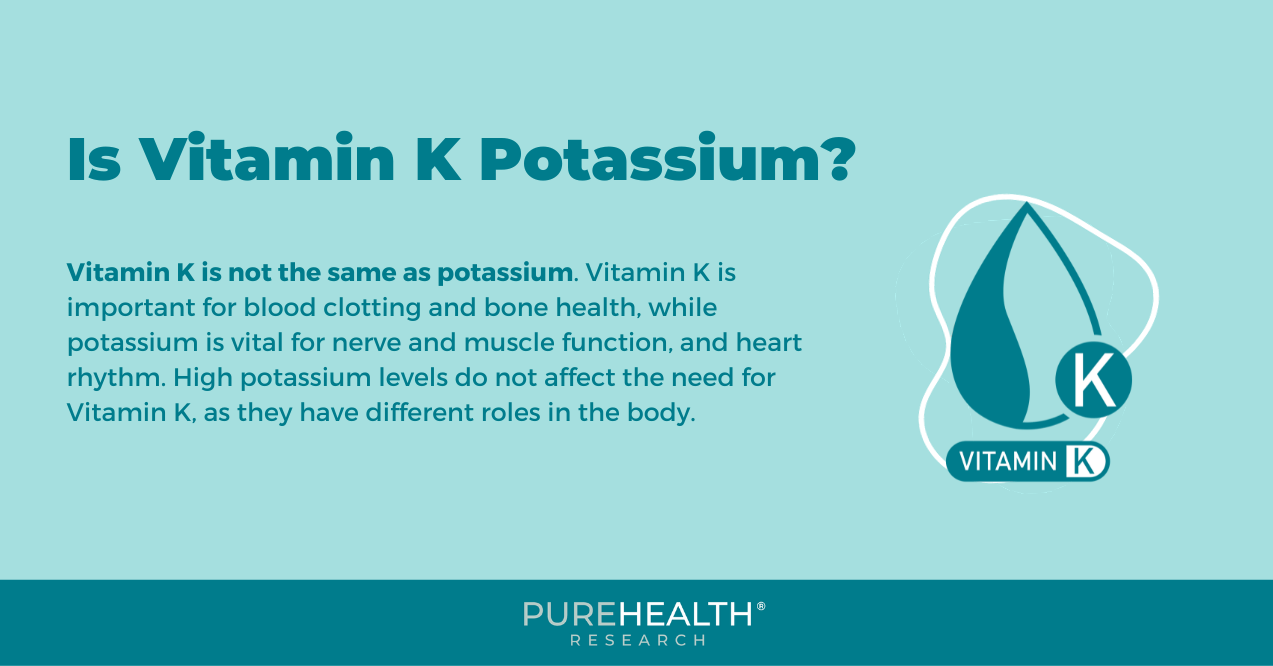
Should I take Vitamin K if my potassium is high? Understanding the distinct roles of Vitamin K and potassium in the body may help answer this question. Vitamin K, a fat-soluble vitamin, is primarily known for its crucial role in aiding blood clotting and preventing excessive bleeding by assisting in the synthesis of proteins required for blood coagulation. It also plays a significant role in bone health, contributing to bone formation and strength, and is found in foods like green leafy vegetables, meat, cheese, and eggs.
In contrast, potassium, a vital mineral and electrolyte, is necessary for several critical bodily functions. It’s essential for proper nerve function, muscle contractions, and maintaining a regular heartbeat. Additionally, potassium is involved in balancing body fluids and regulating blood pressure. Common sources of potassium include bananas, potatoes, beans, and whole grains. Therefore, even if your potassium levels are high, Vitamin K, serving different functions, remains an essential nutrient.
Foods Rich in Potassium
1. Fruits
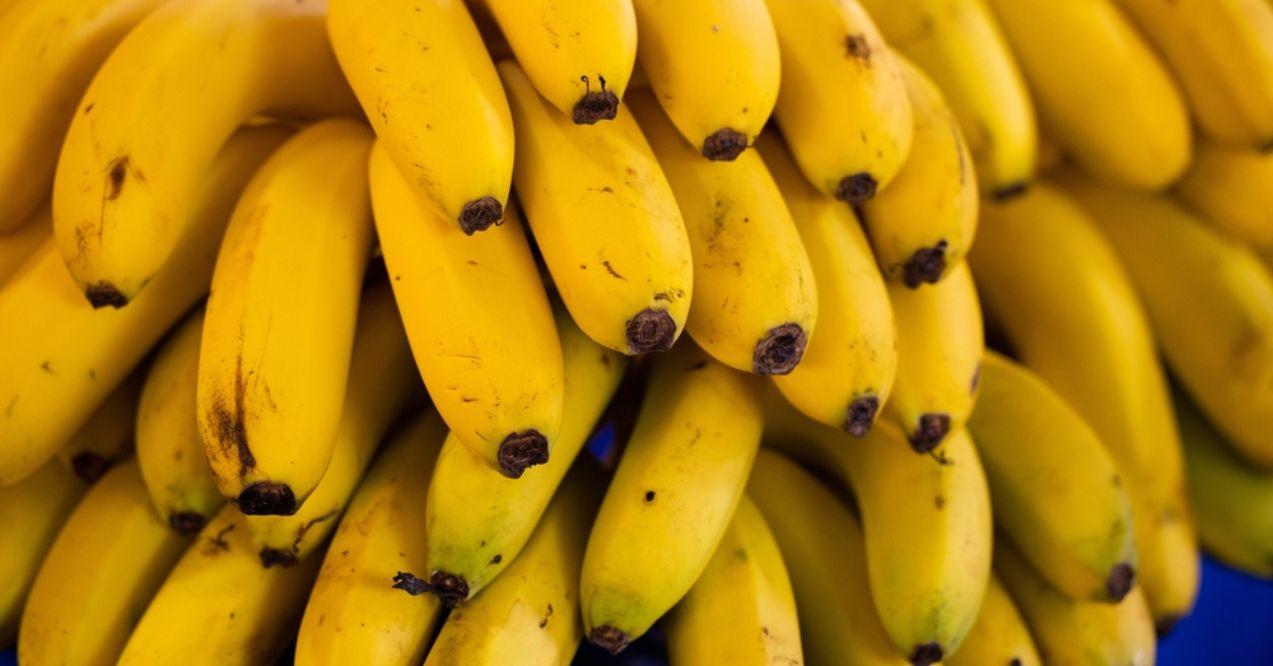
In the world of fruits, several stand out as excellent sources of potassium, an essential mineral vital for maintaining various bodily functions. Bananas are perhaps the most well-known potassium-rich fruit, offering a quick energy boost along with this crucial nutrient. Oranges and cantaloupes are not only refreshing but also pack a significant potassium punch.
For those looking for a tropical twist, avocados and papayas are both delicious and potassium-dense options. Additionally, dried fruits like apricots, prunes, and raisins are concentrated sources of potassium, making them a great choice for a nutrient-rich snack.
2. Potatoes

Potatoes are a surprisingly rich source of potassium, an essential mineral for maintaining various body functions. Often overshadowed by their carbohydrate content, potatoes provide more potassium than bananas, a commonly recognized source of this vital nutrient. This makes them an excellent dietary choice for supporting heart health, muscle function, and nerve signaling.
The potassium content is particularly high in the skin, so enjoying them with their skin on maximizes the benefits. Whether baked, boiled, or steamed, potatoes are a versatile and nutritious addition to any meal, offering a significant amount of potassium.
3. Spinach
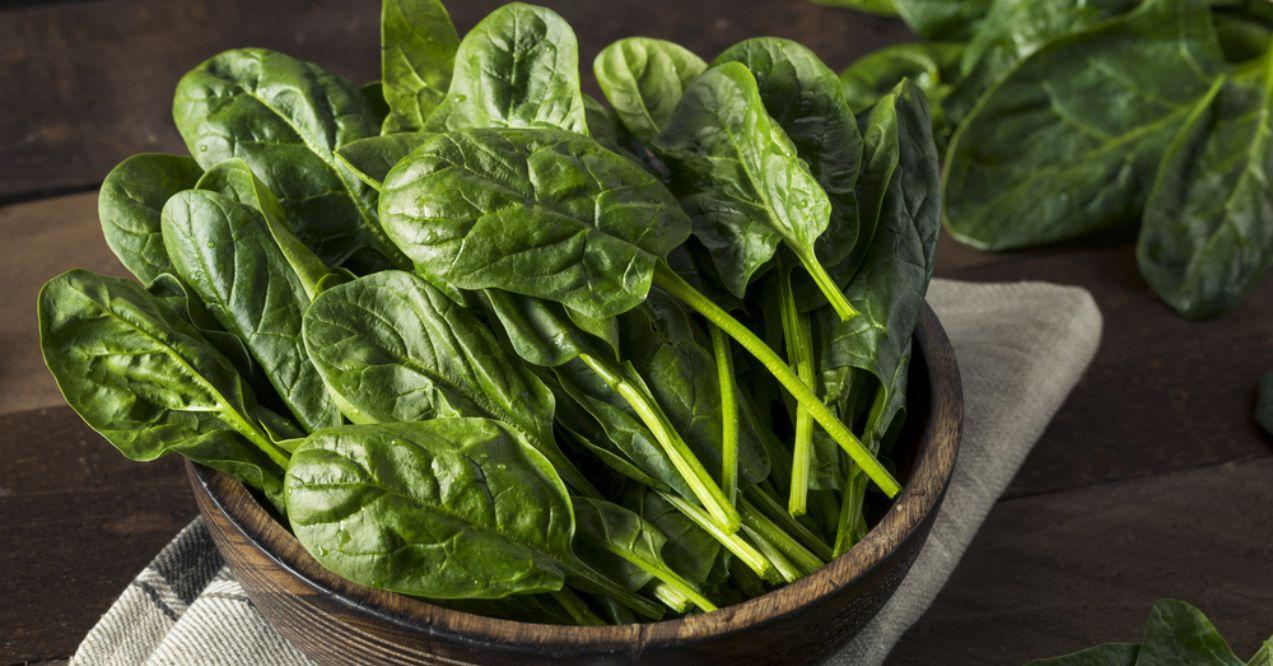
Spinach is an exceptionally potent source of potassium, making it a powerhouse among leafy greens. This nutrient-rich vegetable offers a substantial amount of potassium, which is essential for various bodily functions, including muscle and nerve activity, and maintaining a healthy blood pressure level.
The versatility of spinach allows it to be easily incorporated into a variety of dishes, from fresh salads and smoothies to cooked meals like sautéed side dishes and incorporated into soups and stews. Regular consumption of spinach may contribute significantly to your daily potassium intake, supporting overall cardiovascular health and muscular function, all while providing a host of other vital nutrients and antioxidants.
4. Chicken Breasts

Chicken breast, while often celebrated for its high protein content, is also a valuable source of potassium. This lean meat contributes to the daily intake of this essential mineral, necessary for maintaining proper muscle function, nerve health, and cardiovascular well-being. Chicken breast is a versatile and widely used ingredient in many culinary traditions, easily incorporated into a diverse range of dishes. Whether grilled, roasted, or stir-fried, it provides a healthy, low-fat option for those looking to balance their potassium levels, alongside its other nutritional benefits.
Foods Rich in Vitamin K
1. Leafy Green Vegetables
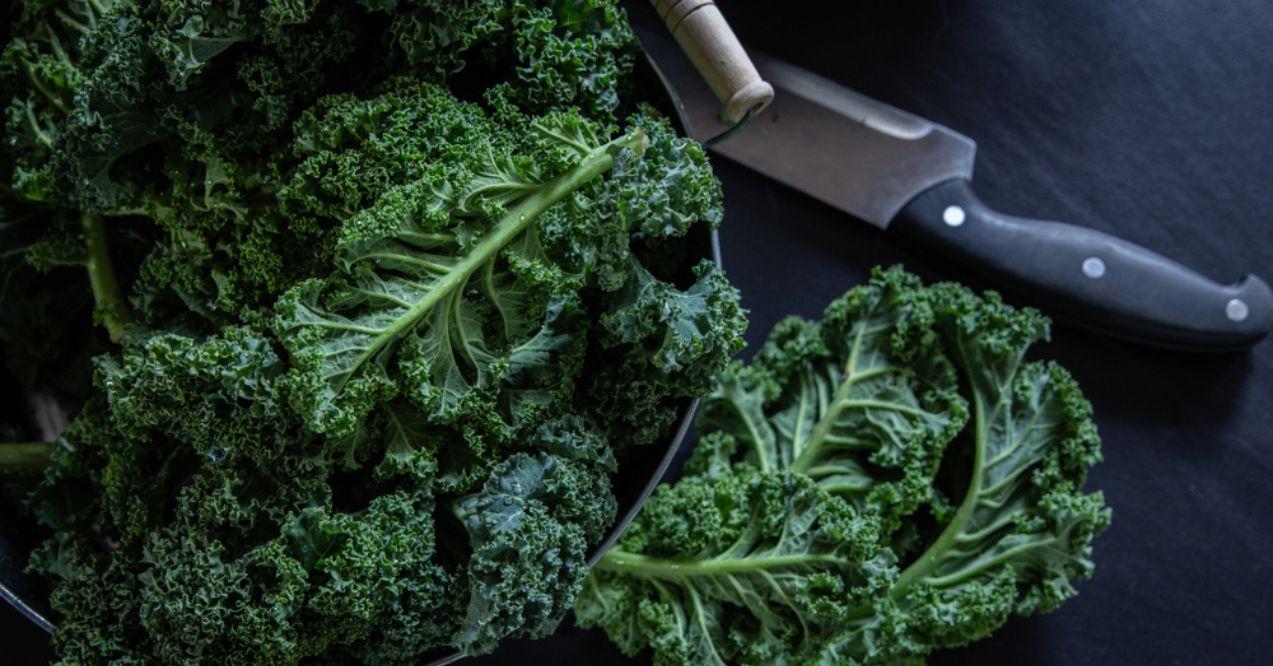
Leafy green vegetables are a treasure trove of Vitamin K, an essential nutrient known for its role in blood clotting and bone health. Among these, kale stands out as a superfood, offering one of the highest concentrations of Vitamin K, which aids in strengthening bones and preventing blood clotting issues.
Spinach, another leafy green, is not only versatile in recipes but also packed with Vitamin K, contributing to cardiovascular health and bone density. Swiss chard and collard greens are equally rich in this vital nutrient, making them excellent additions to a diet focused on improving bone health and blood coagulation.
2. Broccoli
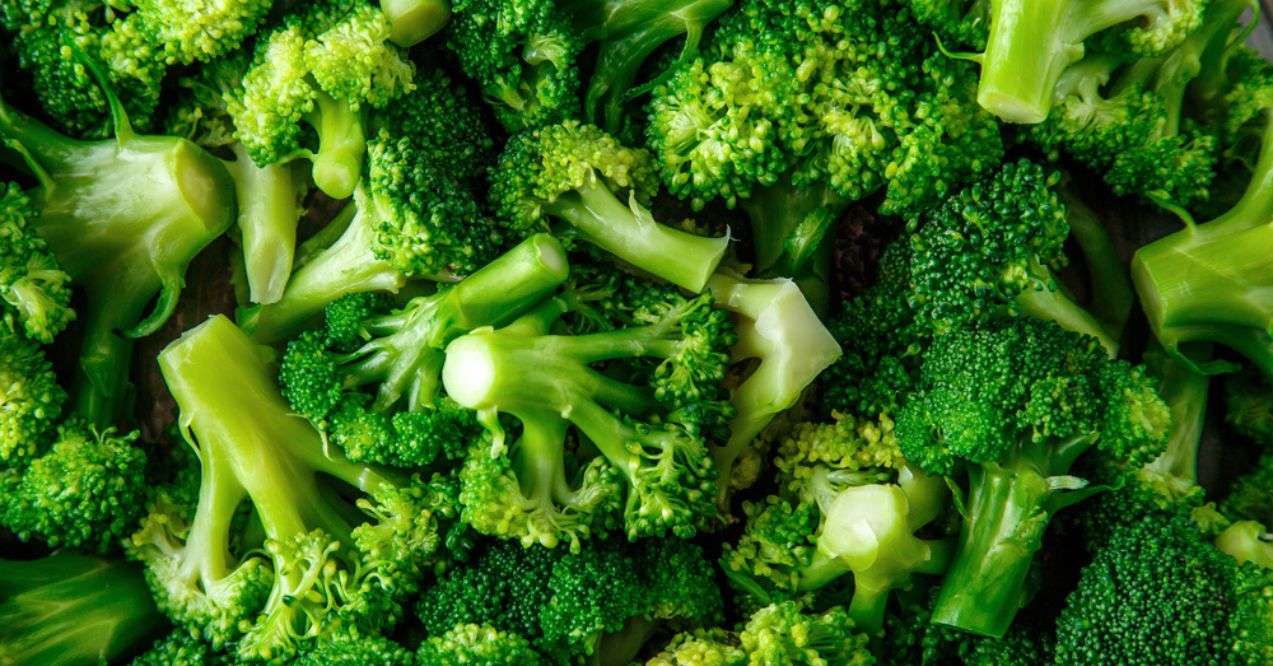
Broccoli is a standout vegetable when it comes to being a rich source of Vitamin K. This cruciferous vegetable not only adds a burst of flavor and texture to meals but also provides a significant amount of this essential vitamin. Vitamin K in broccoli plays a crucial role in promoting bone health and aiding in the blood clotting process. Just a single serving of broccoli may contribute a substantial portion of the daily recommended intake of Vitamin K.
This makes broccoli an excellent choice for those looking to boost their nutrient intake, particularly for maintaining strong bones and healthy blood coagulation. Its versatility in dishes, from stir-fries to salads, makes it an easy and delicious addition to a health-conscious diet.
3. Carrots

Carrots, though often recognized for their high vitamin A content, are also a valuable source of Vitamin K. This essential nutrient in carrots plays a significant role in promoting healthy blood clotting and bone strength. Incorporating carrots into your diet might contribute to the daily recommended intake of Vitamin K.
Their crunchy texture and sweet flavor make them a popular choice in a variety of dishes, from raw snacks and salads to cooked meals. Regular consumption of carrots not only supports vision health due to their beta-carotene content but also bolsters bone health and blood coagulation processes thanks to their Vitamin K contribution.
4. Nuts
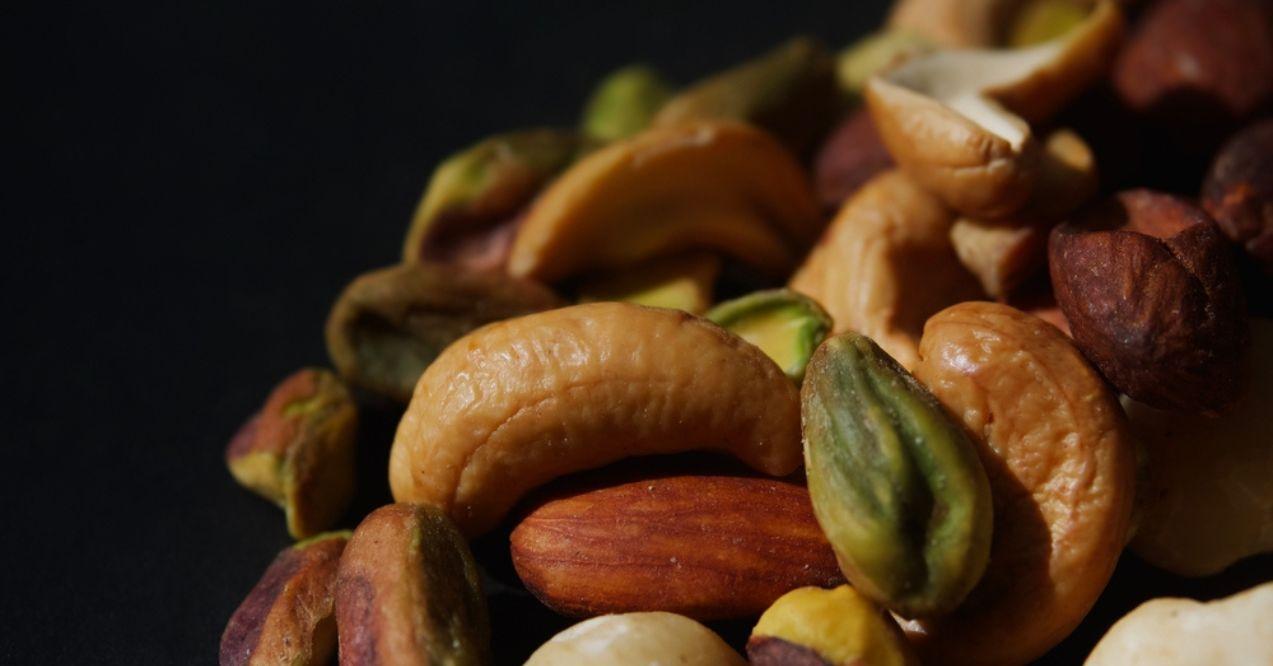
Nuts are an excellent source of Vitamin K, adding a nutritional punch to their already well-known health benefits. Among various types, almonds and pine nuts stand out for their significant Vitamin K content. This vitamin is essential for blood clotting and bone health, making nuts a valuable addition to a balanced diet.
Not only do they offer a convenient and tasty snacking option, but nuts may also be incorporated into meals in various forms, such as crushed in salads, blended into smoothies, or as a crunchy topping on yogurt. Regularly including a variety of nuts in your diet might help ensure an adequate intake of Vitamin K, alongside their other heart-healthy fats, proteins, and fibers.
Conclusion
Understanding the difference between these two nutrients is essential, as Vitamin K supports blood and bone health, while potassium is crucial for muscle function and cardiovascular health. A balanced diet including both nutrients is key for optimal health and wellness.
No, Vitamin K and potassium are not the same. Vitamin K is a fat-soluble vitamin essential for blood clotting and bone health, while potassium is a vital mineral and electrolyte necessary for nerve and muscle function, as well as maintaining heart health and fluid balance.
It’s important to consult a healthcare professional before taking Vitamin K if you have high potassium levels. While these nutrients serve different functions, a medical expert can provide personalized advice considering your specific health conditions and nutritional needs.
Foods rich in Vitamin K include green leafy vegetables like kale, spinach, and broccoli, as well as other sources such as meat, cheese, eggs, and certain fruits like kiwi and grapes. These foods offer a good balance of Vitamin K for healthy blood clotting and bone strength.
Sign up for our Healthy Living newsletter!
Advertisement. This site offers health, wellness, fitness and nutritional information and is designed for educational purposes only. You should not rely on this information as a substitute for, nor does it replace, professional medical advice, diagnosis, or treatment. If you have any concerns or questions about your health, you should always consult with a physician or other health-care professional. Do not disregard, avoid or delay obtaining medical or health related advice from your health-care professional because of something you may have read on this site. The use of any information provided on this site is solely at your own risk.




